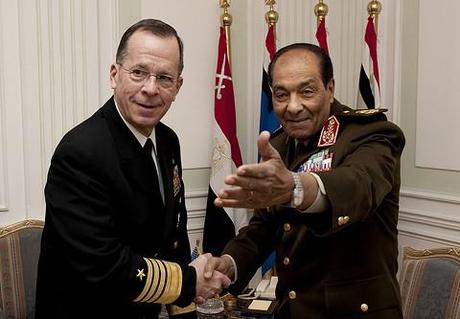
Navy Adm. Mike Mullen, chairman of the Joint Chiefs of Staff is greeted by Egyptian Armed Forces Commander-in-Chief Field Marshal Mohamed Hussein Tantawi in Egypt on Feb. 14, 2010. Photo credit: Chairman of the Joint Chiefs of Staff
Egyptians are going to the polls in droves in the first post-Hosni Mubarak elections. The parliamentary elections follow hot on the heels of nine days of bloody clashes between protesters and security forces in Cairo’s Tahrir Square. The square, one of the birthplaces of the Arab Spring uprising, is still occupied by protesters who want the poll to be postponed.
The pro-democracy protesters insist that the Supreme Council of the Armed Forces (SPAF), which is overseeing the transition to democratic rule, is trying to retain power. ”Either we succeed – politically, economically and socially – or the consequences will be extremely grave and we will not allow that”, Field Marshal Hussein Tantawi said in a statement on Sunday, which was reported by the BBC. At least 41 protesters have been killed and more than 2,000 wounded since revolutionary tensions re-erupted in Egypt.
Despite the unrest on tech streets, a very high turnout has been reported in many areas said the BBC, and in places queues were said to stretch up to two miles as booths opened. Official results from the first phase of voting should be announced on Wednesday, but the final make-up of the lower and upper house of parliament will not be clear until March.
Egypt’s unfolding election has been welcomed by some commentators who seen it as a heart-warming example of democracy in action. Others are far more skeptical and suggest the elections could even tighten the military’s stranglehold on power.
The new parliament is likely have a strong Islamist bloc led by the Muslim Brotherhood, liberal groupings and some reconditioned relics of Hosni Mubarak’s old party, forecast the BBC‘s Kevin Connolly.
Very shaky step towards democracy. A pretty gloomy editorial in The Independent considered the “complicated” elections to be at very best only a “shaky step” towards democracy. The newspaper questioned the judgment of those liberal parties who’ve opted to opt out of the election: “Having failed to get their way, these self-proclaimed guardians of the revolutionary flame now risk being pushed to the political margins.” The Independent forecast that the Islamists of the Muslim Brotherhood and the assorted political heirs to the Mubarak regime, who have distanced themselves from the protests and from attacks on the army, look “set to sweep the board. None of this bodes well.” The paper concluded that if “significant sections of the Egyptian population, including the most ardent defenders of the February revolution, feel cheated by the end of this week, violence in Cairo may well worsen … It would be tragic if a free election in Egypt deepened existing divisions instead of healing them.”
“I trust religious candidates”, says a voter to me in Cairo. “The secular ones don’t fear God”, tweeted author Ed Husain.
Electing more autocrats? Writing at The Washington Post, Jackson Diehl wondered if Egyptians are voting for democracy? He feared that the “the election may take the country away from, rather than toward, a liberal democracy. Complex voting rules and the disorganization of most secular forces mean the new parliament may be dominated by Islamists and former supporters of the Mubarak regime, who were out in force at the polls today. “They are highly organized, they are smart and they have good contacts with the military,” one former Mubarak supporter, Mohammed Sokkar, said of the Muslim Brotherhood outside a polling station in central Cairo. He told me he was voting for the Brotherhood’s Freedom and Justice party.
“We are truly feeling that the revolution is being stolen”, one of the Tahrir leaders, Shadi Ghazali Harb, told The Washington Post.
West musn’t fear political Islam. “Those who support democracy must welcome the rise of political Islam”, insisted Wadah Khanfar at The Guardian’s Comment is free. Khanfar argued that “reform-based Islamic movements, such as the Muslim Brotherhood, work within the political process” and must not be considered in as anything like Jihadist “Islamist” organisations such as Al Qaeda. Khanfar took aim at wrongheaded “western discourse” which portrays Islamists “as newcomers to politics, gullible zealots who are motivated by a radical ideology and lack experience. In fact, they have played a major role in the Arab political scene since the 1920s.” He called on the west to take a “unique opportunity” “to demonstrate that it will no longer support despotic regimes by supporting instead the democratic process in the Arab world, by refusing to intervene in favour of one party against another and by accepting the results of the democratic process, even when it is not the result they would have chosen. Democracy is the only option for bringing stability, security and tolerance to the region, and it is the dearest thing to the hearts of Arabs, who will not forgive any attempts to derail it.”
More on the Arab Spring
- Tahrir Square reoccupied
- Tahrir Square all over again
- Will Assad go the same way as Gaddafi?
- Arab Spring: Moderate Islamist An-Nahda party claim victory in Tunisia’s first democratic election
- Gaddafi is dead – who’s next?
- Asma al-Assad’s greatest hits
- Violence erupts in Cairo

